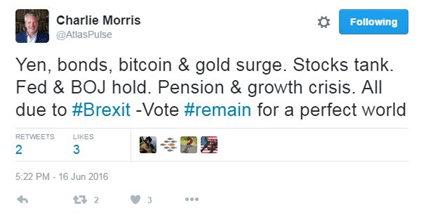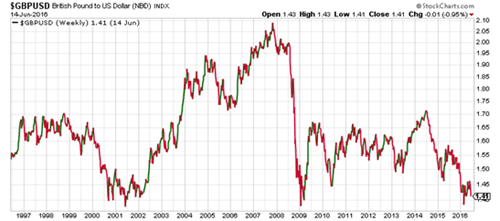Calm down. Deep breaths. Let’s not get sucked into jawboning about politics. Remember, prices are signals. Markets are mechanisms for communicating prices. What do prices tell us about the odds of a Brexit this time next week?
I’ll come back to that in a moment with a chart of the pound. But I’ve just had a read of the latest issue of The Fleet Street Letter from Charlie Morris. Charlie did the prudent thing and prepared the Fleet Street Letter portfolio for Brexit risk months ago. He can afford to be philosophical and a little political in laying out the case for why “project fear” is overdone.
This morning, he turned the full focus of his attention back on markets. And then he took to Twitter to sum up the last 24 hours. And what eventful hours they were. Nada on rates from the Bank of Japan. No “normalisation” from the US Fed until 2017 (maybe). And full blown Brexit anxiety here in the UK.
 Source: Twitter
Source: Twitter
Charlie’s being sarcastic. Everything’s being blamed on Brexit right now. But the larger story is how badly central banks have backed themselves into a policy corner. There’s no obvious way out. The possibilities that remain – helicopter money, more bond buying, or lower negative rates – seem ineffective and destabilising.
Yes that’s the bigger story. We’ve reached an endgame for this era of low rates. They aren’t effective. And no one’s going to laugh at you if you say in public that rates will stay low for an indefinite period of time. Why?
Because there’s no growth, too much debt, and central banks aren’t in any hurry to raise rates when it would kill what credit growth there is. But here’s the thing: when an investment position is that safe to take – when investors become thoughtlessly confident that conditions will remain the same – that’s when things change.
Let me be less cryptic and add one more element to the mix: the British pound. The pundits are telling you that if Leave wins, the pound will crash. This might be good for exporters. But with the UK running a current account deficit equal to 7% of GDP, a sterling crisis (from these levels) would see import prices rise and capital flows to Britain slow.
I use the phrase “sterling crisis” because the chart below doesn’t show the last crisis in 1992 when Britain was forced to drop out of the Exchange Rate Mechanism. The resulting crisis led to a fall in the pound, although not the end of the world. And this time?
Well, the chart below – the market signal – tells you the pound has already had its crisis. Ever since the Fed began talking of rate hikes in mid-2014, sterling’s gone lower against the US dollar. It’s now near the levels it traded at in 2001 and 2009. Those were crisis lows from which big up-moves ensued. Looking at the chart below, you’d say that for the pound, this is as bad as it gets (at least on Brexit fears).

That’s the conventional view. All things being equal, markets are telling you Remain will win comfortably. The crisis lows have been made on the uncertainty of the outcome. A vote to Remain ought to see a big rally in the pound. Why?
All that capital that’s been waiting on the side lines for the vote will come pouring back into the housing and equity markets. And the scared money that’s poured into gilts, driving 10-year yields to record lows and 30-year yields under 2% for the first time… well that money may go look for the nearest risk to take.
What’s the wild card? The wild card is that prices only reflect what people value in monetary terms. A political decision is not a monetary one. The pound, then, may not be the best bellwether for a political crisis. And that’s what Brexit would be – a potential European political crisis made real, and from which there would be real economic and financial consequences.
You can’t “price in” what you don’t know. And that’s about where we’re at the moment. It’s a great market for traders. But for investors, take some deep breaths.
Category: Market updates

